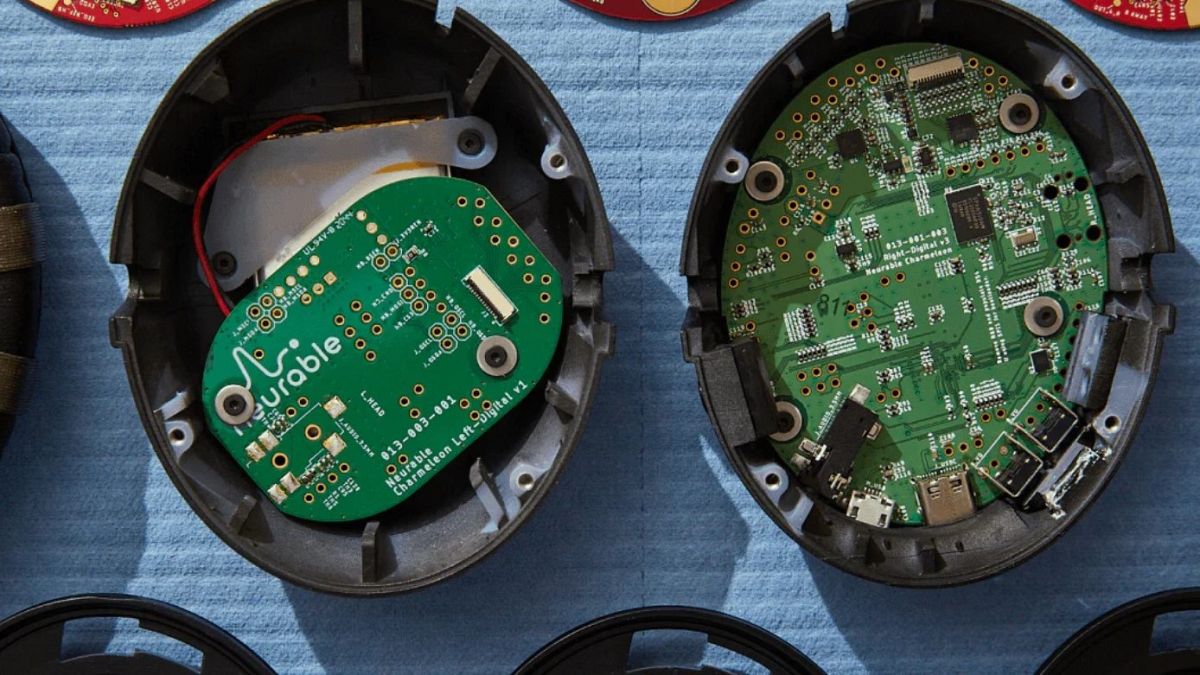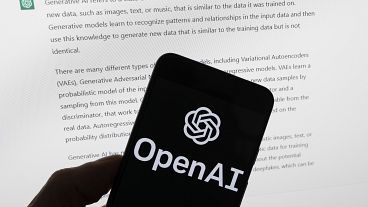Headphones that can tell you when you’re tired and should take a break could be on sale later this year. Euronews Next tried them out at VivaTech.
Biohacking has been a buzzword for years, a broad term encapsulating techniques that can “hack” our biology to make improvements to our lives.
Speaking at a panel discussion on ethics and opportunities of biohacking at this year’s VivaTech in Paris, Gabriela Ramos, the assistant director-general for the social and human sciences at UNESCO, defined biohacking as "knowing your own biology and doing things to improve it".
Examples of biohacking could be something as simple as drinking coffee to give yourself a caffeine-induced energy boost to wearing smart watches or rings to track heart rate, blood pressure, or sleep.
According to Ramos, the biohacking industry is currently worth around $14 billion (€12.9 billion) and is growing at a rate of 20 per cent a year.
A developing subset of biohacking was on show at Vivatech on Wednesday: "neurohacking".
This refers specifically to techniques for hacking your brain, and can include things like taking supplements to improve brain function, to surgically-implanted neural devices to treat illnesses.
Speaking on the same panel as Ramos was Dr Ramses Alcaide, CEO of Neurable.
His company is developing headphones that can track brain signals, detecting when the wearer is in a state of deep focus, or when their focus is slipping.
"These headphones here have silver bands that are actually electrodes, and they look like soft cloth," he told Euronews Next.
"They record brain activity from around your ear area. And then using our AI, we're able to boost that signal so that we can pick up a lot of the core of responses across your brain".
Reading your brain waves
Because the frontal lobe of the brain is an area associated with focus, the headphones are able to detect relevant signals that Neurable’s artificial intelligence programme is able to amplify.
Euronews Next had the opportunity to test the headphones for ourselves, and saw how the focus levels were visually presented as increased when actively concentrating on something.
The idea behind them is to give people better knowledge of their own state of focus and mental fatigue, which will help users to know when to take a break.
"We actually just did a study at the Mayo Clinic where we saw that if you're able to take breaks at the right time, we were able to reduce end of day stress by 20 per cent and increase end of day happiness by 70 per cent," said Alcaide.
This insight could help to address the "huge epidemic" of burnout from overworking, he added, by helping people to understand when to take breaks throughout the day.
"It just plays a small tone through your ear like, 'Hey, it's time to take a break,' and you can ignore it if you want to, depending on where you are with your work task," he said.
"What we see in our data is that taking a five-minute break at a key spot will actually increase your focus for the next four hours".
He said this could be especially powerful for jobs like programming, where research has shown coding is often better in the first half of the day, while mistakes start to be introduced later on in the day as developers get cognitively tired.
Brain-computer interfaces
The headphones are an example of a brain-computer interface (BCI) - direct communication between brain activity and a computer or device. They are a non-intrusive type of BCI, unlike those that require surgical implementation into the brain.
Surgically-implanted devices are much more powerful, and are used for medical procedures in severe cases.
Companies such as the Elon Musk-founded Neuralink are developing surgically implanted BCIs that will allow people to control a computer or mobile device with their brain.
Non-intrusive devices - ones that don’t require surgical input - are less powerful, but thanks to AI and machine learning, companies like Neurable are able to sufficiently boost brain signals to develop use cases.
"For example with our current system we can do things like changing tracks when you're listening to music, as well as using it to understand cognitive health," said Alcaide.
‘A lot of fear-mongering’
The spectre of what happens if brain data gets into the wrong hands was discussed during the talk on stage at VivaTech.
One question raised concerns about what happens if employers get hold of employee data, and discriminate against those that need more cognitive rest than others.
Regulation of BCI is heavier in Europe, which, according to Alcaide, means European companies working on it are going to struggle to compete.
"It's going to take longer in Europe, where there is a lot more regulation," he said.
"Most of it is really unnecessary at this point because… it's like, for example, regulating accelerometers. That's the level of information we're getting from the brain".
UNESCO’s Ramos defended governments and institutions against accusations that they were getting in the way of progress and innovation in the sector by being too heavy-handed with regulations.
Someone always needs to be held accountable when things go wrong, she argued, and it is the job of governments to make sure potentially dangerous technologies are developed in a safe and responsible way.
For Alcaide, fears around what BCIs can do with the current state of the technology are unfounded.
"I've worked with a lot of governmental groups when it comes to regulation for brain computer interfaces - and it's a lot of it is fear mongering," he said.
"They're afraid that some countries are going to use our technology to make incredible fighter pilots or something. But the reality of it is we're just trying to get to the point where somebody with ALS (amyotrophic lateral sclerosis) can communicate to a caregiver.
"And that's even 20 years out, before that's done effectively, essentially".
He argues that authorities should hold off on further regulation for now, to let the technology develop. “There's still a lot of innovation that we don't want to prevent, and we're still really far away from anything related to dystopia,” he added.
Alcaide believes the technology is “going to really change the way people understand themselves,” allowing people to look after their mental health and their brains.
"It's going to enable higher productivity, but not at the cost of anybody. So, if anything, people are going to be energised about the work they're doing and it's going to be healthier at the end of the day for individuals with less stress".
Neurable’s technology is being implanted into a major headphone brand’s products ahead of a launch later this year.
While he couldn’t name the brand yet, he said they would be a headphone version of the Apple Watch, enabling users to track their cognitive health.



